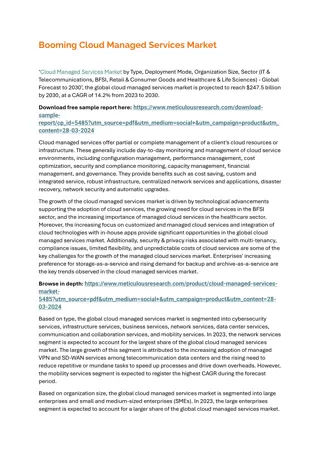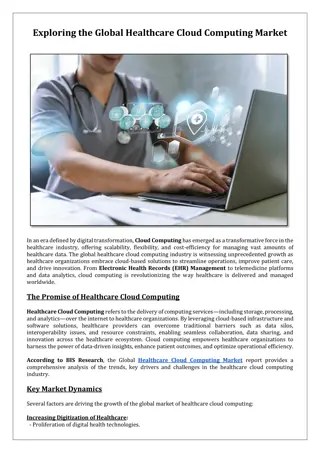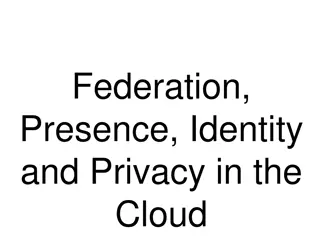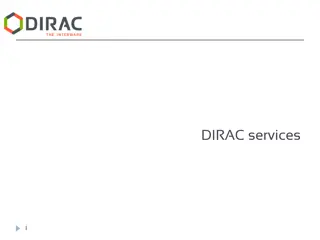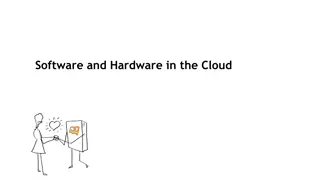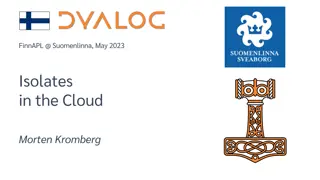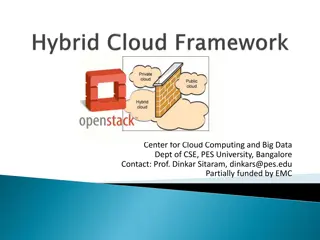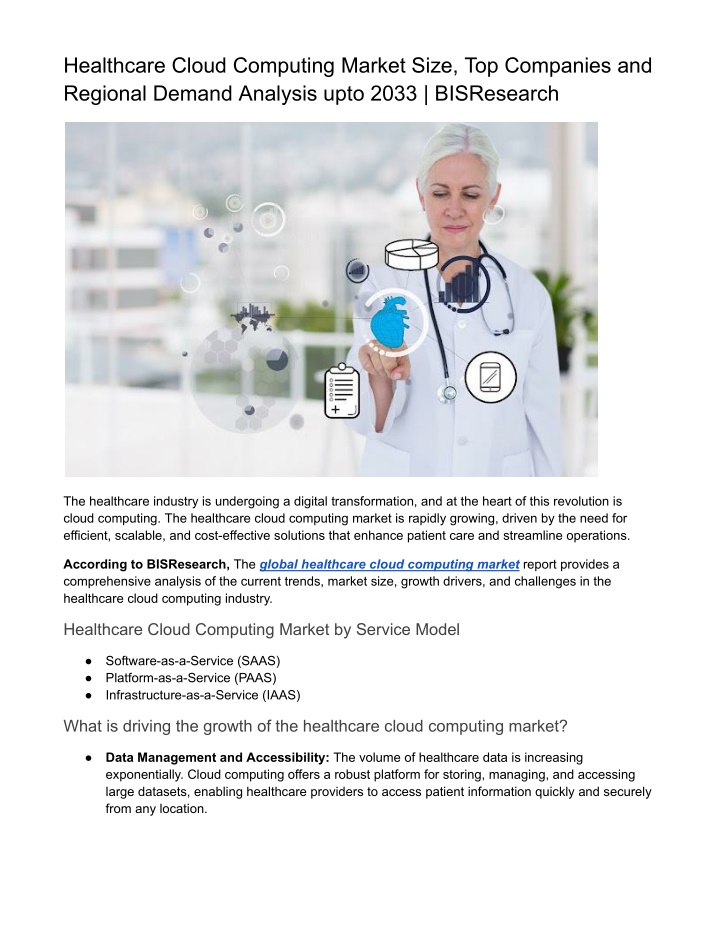
Healthcare Cloud Computing Market
The global healthcare cloud computing market report provides a comprehensive analysis of the trends, growth drivers, and challenges in the healthcare industry.nnRead Report Overview: //bisresearch.com/industry-report/global-healthcare-cloud-com
Download Presentation

Please find below an Image/Link to download the presentation.
The content on the website is provided AS IS for your information and personal use only. It may not be sold, licensed, or shared on other websites without obtaining consent from the author. If you encounter any issues during the download, it is possible that the publisher has removed the file from their server.
You are allowed to download the files provided on this website for personal or commercial use, subject to the condition that they are used lawfully. All files are the property of their respective owners.
The content on the website is provided AS IS for your information and personal use only. It may not be sold, licensed, or shared on other websites without obtaining consent from the author.
E N D
Presentation Transcript
Healthcare Cloud Computing Market Size, Top Companies and Regional Demand Analysis upto 2033 | BISResearch The healthcare industry is undergoing a digital transformation, and at the heart of this revolution is cloud computing. The healthcare cloud computing market is rapidly growing, driven by the need for efficient, scalable, and cost-effective solutions that enhance patient care and streamline operations. According to BISResearch, The global healthcare cloud computing market report provides a comprehensive analysis of the current trends, market size, growth drivers, and challenges in the healthcare cloud computing industry. Healthcare Cloud Computing Market by Service Model Software-as-a-Service (SAAS) Platform-as-a-Service (PAAS) Infrastructure-as-a-Service (IAAS) What is driving the growth of the healthcare cloud computing market? Data Management and Accessibility: The volume of healthcare data is increasing exponentially. Cloud computing offers a robust platform for storing, managing, and accessing large datasets, enabling healthcare providers to access patient information quickly and securely from any location.
Cost Efficiency: Traditional on-premise data centers require significant investment in hardware, software, and maintenance. Cloud computing reduces these costs by offering a pay-as-you-go model, allowing healthcare organizations to scale resources according to their needs. Regulatory Compliance: Cloud service providers often offer compliance with healthcare regulations such as HIPAA (Health Insurance Portability and Accountability Act) in the U.S. and GDPR (General Data Protection Regulation) in Europe, ensuring that patient data is protected and handled according to legal standards. Collaboration and Innovation: Cloud platforms facilitate collaboration between healthcare professionals, researchers, and institutions. They enable the sharing of data and resources, fostering innovation in medical research, telemedicine, and personalized medicine. Request A Free Sampleon Healthcare Cloud Computing Market! Challenges in Healthcare Cloud Computing Market Data Privacy and Security: Despite advancements in cloud security, concerns about data breaches and unauthorized access remain. Healthcare organizations must carefully select cloud providers that offer robust security measures and comply with regulatory standards. Integration with Legacy Systems: Many healthcare providers still rely on legacy systems that may not be compatible with cloud technologies. Integrating these systems with cloud-based solutions can be complex and costly. Cost Management: While cloud computing can reduce IT costs, managing and optimizing cloud expenses requires careful planning and monitoring. Healthcare organizations need to ensure they are utilizing cloud resources efficiently to avoid unexpected costs. Dependence on Internet Connectivity: Cloud services require reliable internet connectivity. In regions with limited or unstable internet access, relying on cloud solutions can pose challenges. What are the key trends in healthcare cloud computing? AI and Machine Learning: The integration of artificial intelligence (AI) and machine learning (ML) with cloud computing is set to revolutionize healthcare. These technologies can analyze vast amounts of data to provide predictive insights, improve diagnostics, and personalize treatment plans. Interoperability and Data Sharing: The future of healthcare cloud computing lies in achieving seamless interoperability between different healthcare systems and providers. This will enable better data sharing and collaboration, leading to improved patient outcomes. Blockchain for Data Security: Blockchain technology can enhance data security and transparency in healthcare cloud computing. It can provide a decentralized and tamper-proof system for managing patient records and transactions. Edge Computing: Edge computing, which processes data closer to the source rather than in a centralized cloud, can reduce latency and improve the performance of cloud-based healthcare applications. This is particularly important for real-time applications such as remote patient monitoring. Who are the key players in the healthcare cloud computing market? Amazon Web Services, Inc.
Microsoft Corporation International Business Machines Corporation Oracle athenahealth Download Our ToC: Click Here! Conclusion The healthcare cloud computing market is poised for significant growth as healthcare organizations increasingly adopt cloud technologies to improve patient care, enhance operational efficiency, and drive innovation. While challenges remain, the benefits of cloud computing in healthcare are undeniable. By addressing security concerns, ensuring interoperability, and leveraging emerging technologies, the healthcare industry can fully realize the potential of cloud computing and transform the future of healthcare delivery.

